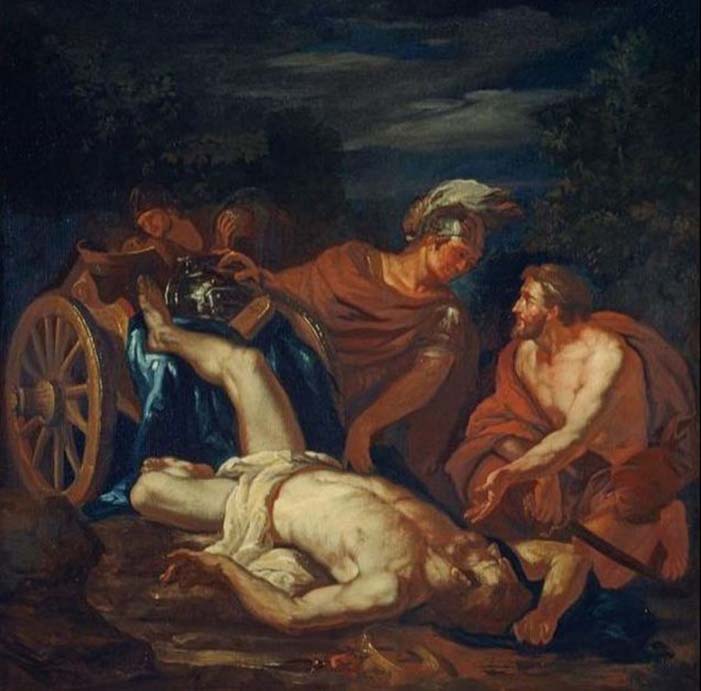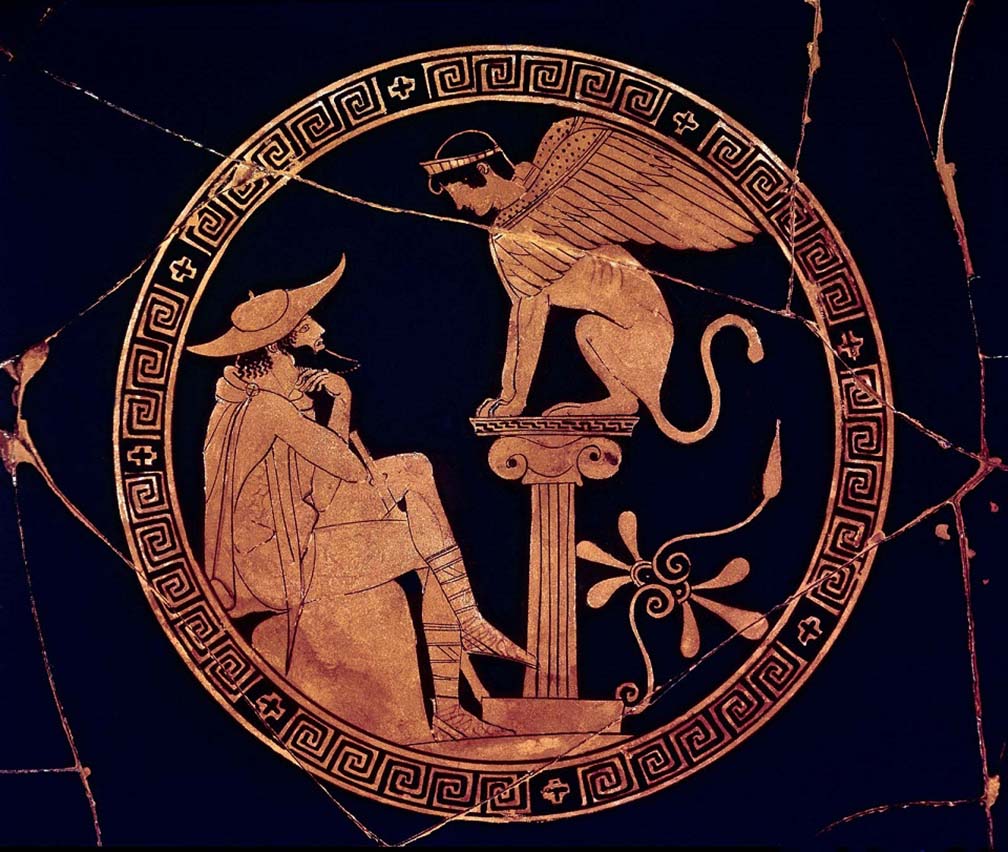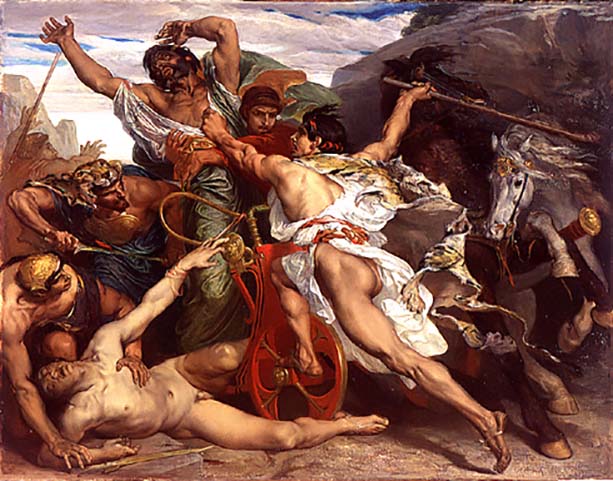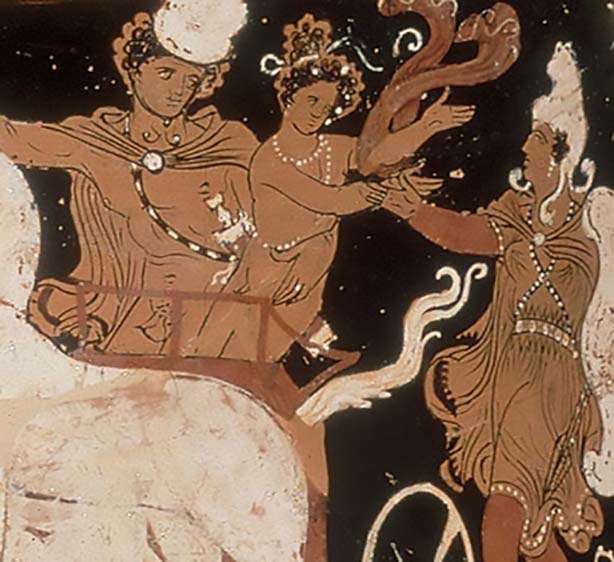Laius
"Lord of Thebes, do not sow a furrow of children against the will of the gods; for if you beget a son, that child will kill you, and all your house shall wade through blood."
(The Oracle of Delphi to Laius 1. Euripides, Phoenician Women 20).
"And Laius' charioteer ordered him: "Stranger, make way for the king!" But he walked on without a word, in his pride. The horses with their hoofs drew blood from the tendons of his feet. Then—why need I speak of matters outside these evils?—son slew father, and taking his chariot gave it to Polybus, his foster-father."
(Euripides, Phoenician Women 40).
Laius was king of Thebes. For ignoring a Delphic oracle he was killed by his own son.
The father of Laius
Laius's father Labdacus came to the throne of Thebes after Pentheus, the king whom the Maenads destroyed for having opposed the god of the vine Dionysus. Labdacus nurtured the same narrow ideas about law and order as Pentheus, and therefore suffered a similar death.
During his reign the Thebans engaged in a war against the Athenians for a matter of boundaries. But the Athenians, who were at the time ruled by King Pandion, received unexpected military aid from the Thracian king Tereus, who effectively help them bring the war to a successful close.
So although it is well known that Labdacus was killed by the Maenads for having, like Pentheus, opposed the Bacchanals, his power was weakened as well by his war; for it is also well known that
"There is no other way by which states go more quickly and completely to ruin than by war." (Erasmus of Rotterdam 1469-1536, Adages IV.i.1).

Oedipus' father loses his rights
On his death, Labdacus left a heir Laius. But as he was only a child, Lycus — an usurper — seized power in Thebes, and reigned for 20 years. He was finally overthrown by Amphion and his twin brother Zethus, who, coming to Thebes, slew both Lycus and his wife Dirce. The death of Lycus did not restore Laius to the throne.
For once the twins had eliminated the regent and the first lady, they came to believe that such crimes are naturally followed by the acquisition of power and other plenties. So they decided to take over the kingdom of Thebes, and having fortified the city, they expelled Laius.
Laius and Chrysippus
During the reign of Amphion, Laius lived as and exile in the Peloponnesus. He was generously hosted by King Pelops, though the latter's sister Niobe was married to Amphion. It is told that Laius fell in love with Chrysippus — a bastard son of Pelops by the nymph Danais — in the course of the Nemean Games while teaching him to drive the chariot, and carried him off.
The legitimate sons of Pelops and Hippodamia, Atreus and Thyestes, pursued him and arrested him, but Laius obtained mercy from Pelops who refused to punish love. Hippodamia, then, found the occasion fit to have the bastard Chrysippus killed. Arguing that he could become a contestant for the kingship, she tried to persuade her sons to assassinate him.
But the time for bloodthirsty deeds had not yet arrived for Atreus and Thyestes, and they refused. So at night Hippodamia visited Laius and Chrysippus when they were asleep, and taking the sword of the Theban, she wounded Chrysippus and fixed the sword in his body, so that Laius would be suspected. However, Chrysippus acknowledged the truth before dying and Pelops banished his wife, who, according to some, committed suicide.
The ruin of the house of Amphion
Now Amphion's wife Niobe provoked with her boasts and insults the wrath of the sweet children of Leto — Apollo and Artemis — who from afar shot their children (the Niobids) with their arrows. In other words, the Theban Royal House was left desolate by plague.
Also Zethus' son was killed through some mistake, and Zethus himself died of a broken heart. And while Niobe left the country and went to her father Tantalus at Sipylus where she was transformed into a stone by Apollo, Laius was restored by the Thebans as king.

Laius king
Once he became king, Laius married Jocasta, daughter of Menoeceus and sister of Creon. At this time an oracle came from Delphi warning him not to have a son because that son was fated to kill his own father. Despite the oracle Laius, flushed with wine, had intercourse with his wife and she conceived a son.
But later, remembering the oracle, Laius pierced his son's ankles with brooches or spikes and gave it to a herdsman to expose it on Cithaeron, a mountain between Boeotia and Attica.
However, the horsemen of King Polybus of Corinth found it and brought it to the king's wife Queen Periboea, who adopted him. Then she, having healed his ankles, called him Oedipus, because of his swollen feet.
Delphic oracle fulfilled
As Oedipus came to manhood in the court of King Polybus, proving to be a courageous young man, his companions, out of envy, taunted him with not being the king's son because, they said, King Polybus was so mild and Oedipus so assertive.
So as the doubt began to grow in Oedipus' mind he asked first Queen Periboea, but not being able to learn anything from her, he decided to go to Delphi and inquire the oracle about his true parents.
The Oracle told him not to go to his native land, because he would murder his father and lie with his mother. On hearing the warning, and believing himself to be the son of the royal couple who had adopted him, Oedipus left Corinth.
But while he drove his chariot — some say through the Cleft Road to Phocis — he met his father in a certain narrow road. Laius had also been at Delphi because some prodigies had revealed that death at his son's hands was near, and he wanted to make sure that the child he had exposed was dead.
When they met in the narrow road Polyphontes, the king's herald, ordered Oedipus to give way. As Oedipus delayed, the herald killed one of his horses, or as others say, the king urged on his own horses and a wheel grazed Oedipus' foot. In any case the enraged Oedipus slew the herald, and dragging Laius from the chariot, killed him too.
Another with identical name
Laius entered, together with Celeus, Cerberus and Aegolius, the cave of Zeus in Crete in order to gather the honey of the sacred bees. He was turned into a bird by the god (Lib.Met.19).

Sources
Pausanias. Description of Greece, 9.5.6.
Euripides, Phoenician Women
Apollodorus. Library, 3.5.5.
Rist, John M. (December 2001). "Plutarch's Amatorius: A Commentary on Plato's Theories of Love?". The Classical Quarterly. 51 (2): 557–575. doi:10.1093/cq/51.2.557. ISSN 1471-6844.
Apollodorus. Library, 3.5.7.
Tripp, p. 337.
Ησίοδος, Θεογονία 326 ff
Αισχύλος, Επτά επί Θήβας 539 ff, 773 ff
Απολλόδωρος (ψευδο-), Βιβλιοθήκη 3. 52 - 55
Ηρόδοτος, Ιστοριών 4. 79. 1
Λυκόφρων ο Χαλκιδεύς, "Αλεξάνδρα" 1465
Παυσανίας, Ελλάδος περιήγησις 9. 26. 2, 5. 11. 2
Διόδωρος Σικελιώτης, Ἱστορικὴ Βιβλιοθήκη 4. 64. 4
Κλαύδιος Αιλιανός, Περὶ ζῴων ἰδιότητος 12. 7, 12. 38
Υγίνου, Fabulae 151
Οβίδιος, Μεταμορφώσεις 7. 759 ff
Σενέκα, Οιδίπους 87 ff, 245 ff
Στάτιος, Θηβαΐδα 2. 500 ff, 1. 66
Σοφοκλής, Οιδίπους Τύραννος
Σοφοκλής, Οιδίπους επί Κολονώ
Ελληνική Μυθολογία της Εκδοτικής Αθηνών
Τα Βοιωτικά του Παυσανία της Εκδοτικής Αθηνών
Λεξικό του Αρχαίου Κόσμου του Ι. Λάμψα
Εγκυκλοπαίδεια της αρχαίας Βοιωτίας της Τ. Τσάκου – Κονβερτίνο
Λεξικόν της Ελληνικής Αρχαιολογίας του Ι.Ρ. Ραγκαβή
Ιστορία της Θήβας και της Βοιωτίας του Γ. Τσεβά
Επιδαύρια 1997: Πρόγραμμα της θεατρικής παραστάσεως «Φοίνισσαι» του Ευρυπίδη.
Αισχύλου Επτά επί Θήβας Εκδόσεις Επικαιρότητα
Σοφοκλέους Αντιγόνη Κριτική και ερμηνευτικά έκδοση Γ. ΜαρκαντωνάτουΕκδόσεις Gutenberg.
"Greek Mythology Link"













